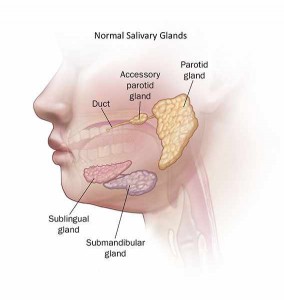-
Cancer
Tuesday Q and A: Intermittent swelling in jaw should be evaluated
 DEAR MAYO CLINIC: A week ago I woke up with some swelling inside my mouth near my jaw. It went away after an hour or so, but happened again two nights later. Could this be a blocked salivary gland? If so, what is the treatment for it?
DEAR MAYO CLINIC: A week ago I woke up with some swelling inside my mouth near my jaw. It went away after an hour or so, but happened again two nights later. Could this be a blocked salivary gland? If so, what is the treatment for it?
ANSWER: It is possible that a blocked salivary gland could be causing your symptoms. But another disorder might be the source of the problem, too. Treatment for your condition will need to be based on the underlying cause. Make an appointment to see a doctor for an evaluation. Once the root cause is identified, your doctor can make a treatment plan that fits your situation.
Your salivary glands make saliva. Saliva aids in digestion and keeps your mouth moist. You have three pairs of major salivary glands under and behind your jaw — parotid, sublingual and submandibular. You also have many other tiny salivary glands in your lips, inside your cheeks, and throughout your mouth and throat. Ducts connect to your salivary glands and drain saliva from them into your mouth and throat.
If the glands become blocked and saliva cannot flow out of them, you may develop pain and swelling in your face and mouth, dry mouth and difficulty swallowing. You also may have a hard time opening your mouth.
In some people, the chemicals in saliva leave behind minerals in the salivary ducts. Over time, those minerals can build up and form salivary duct stones. If the stones become big enough, they may block the duct, and saliva is no longer able to drain from the gland. Stones most often form in the ducts that lead from the submandibular glands — the two salivary glands that are at the back of your mouth under either side of your jaw.
Formation of scar tissue from an injury or due to inflammation could block a salivary gland or duct. In some cases, radioactive iodine treatment — often used for thyroid disorders — may result in salivary gland obstruction. A tumor could also be part of the problem. Tumors may develop within a salivary gland, or a tumor near a salivary duct may block the flow of saliva through the duct. Salivary gland cancer is rare. Most tumors that affect the salivary glands and ducts are not cancerous.
From your description it sounds like an obstruction is the most likely explanation for your symptoms, but another source of the problem could be an infection. A salivary gland infection, called sialadenitis, often results in symptoms similar to those of a blocked salivary gland. In some cases, a blocked duct can contribute to an infection. Dehydration may lead to a salivary gland infection, too. When you get dehydrated, your saliva may become thick and flow more slowly than normal. That creates an environment where bacteria can thrive.
Instead of a blocked gland or an infection, it also is possible that one of your salivary glands could be enlarged. An enlarged salivary gland may be due to disorders that affect the nerves that lead to the ducts. These disorders are sometimes referred to as sialadenosis. Rarely, an enlarged gland is the result of an autoimmune disorder known as Sjögren’s syndrome.
Finally, the swelling could be due to a ranula — a condition in which salivary secretions accumulate under the lining of the floor of the mouth. This is typically related to the sublingual glands, but the submandibular glands may also be the source.
To find out exactly what is causing your symptoms, make an appointment to see a doctor that is knowledgeable about the structures of the mouth and salivary glands. In most cases, a physical exam along with imaging tests, such as an X-ray or ultrasound, can confirm a diagnosis. Treatment can then be customized to address the specific underlying problem. — Jan Kasperbauer, M.D., Otorhinolaryngology, Mayo Clinic, Rochester, Minn.







